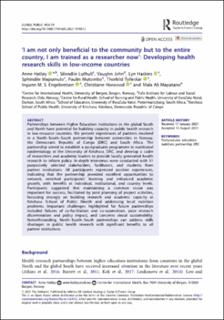| dc.contributor.author | Hatløy, Anne | |
| dc.contributor.author | Luthuli, Silondile | |
| dc.contributor.author | John, Vaughn | |
| dc.contributor.author | Haskins, Lyn | |
| dc.contributor.author | Mapumulo, Sphindile | |
| dc.contributor.author | Mutombo, Paulin Beya | |
| dc.contributor.author | Tylleskär, Thorkild | |
| dc.contributor.author | Engebretsen, Ingunn Marie Stadskleiv | |
| dc.contributor.author | Horwood, Christiane | |
| dc.contributor.author | Mapatano, Mala Ali | |
| dc.date.accessioned | 2021-09-08T09:10:06Z | |
| dc.date.available | 2021-09-08T09:10:06Z | |
| dc.date.created | 2021-09-07T09:37:18Z | |
| dc.date.issued | 2021 | |
| dc.identifier.issn | 1744-1692 | |
| dc.identifier.uri | https://hdl.handle.net/11250/2774562 | |
| dc.description.abstract | Partnerships between Higher Education Institutions in the global South and North have potential for building capacity in public health research in low-resource countries. We present experiences of partners involved in a North–South–South partnership between universities in Norway, the Democratic Republic of Congo (DRC) and South Africa. The partnership aimed to establish a postgraduate programme in nutritional epidemiology at the University of Kinshasa, DRC, and develop a cadre of researchers and academic leaders to provide locally generated health research to inform policy. In-depth interviews were conducted with 31 purposively selected stakeholders, facilitators, and students from partner institutions. All participants expressed positive experiences, indicating that the partnership provided excellent opportunities to network, enriched participants’ learning and enhanced academic growth, with benefits at individual, institutional, and country levels. Participants suggested that maintaining a common vision was important for success, facilitated by joint planning of project activities, focussing strongly on building research and academic capacity at Kinshasa School of Public Health and addressing local nutrition problems. Important challenges highlighted for future partnerships included failures of co-facilitation and co-supervision, poor research dissemination and policy impact, and concerns about sustainability. Notwithstanding, North–South–South partnerships can address skills shortages in public health research with significant benefits to all partner institutions. | en_US |
| dc.language.iso | eng | en_US |
| dc.publisher | Taylor & Francis | en_US |
| dc.rights | Attribution-NonCommercial-NoDerivatives 4.0 Internasjonal | * |
| dc.rights.uri | http://creativecommons.org/licenses/by-nc-nd/4.0/deed.no | * |
| dc.title | ‘I am not only beneficial to the community but to the entire country, I am trained as a researcher now’: Developing health research skills in low-income countries | en_US |
| dc.type | Journal article | en_US |
| dc.description.version | publishedVersion | en_US |
| dc.rights.holder | Copyright 2021 the authors | en_US |
| cristin.ispublished | true | |
| cristin.fulltext | original | |
| cristin.qualitycode | 1 | |
| dc.identifier.doi | 10.1080/17441692.2021.1974512 | |
| dc.identifier.cristin | 1931840 | |
| dc.source.journal | Global Public Health | en_US |
| dc.identifier.citation | Global Public Health. 2021. | en_US |

